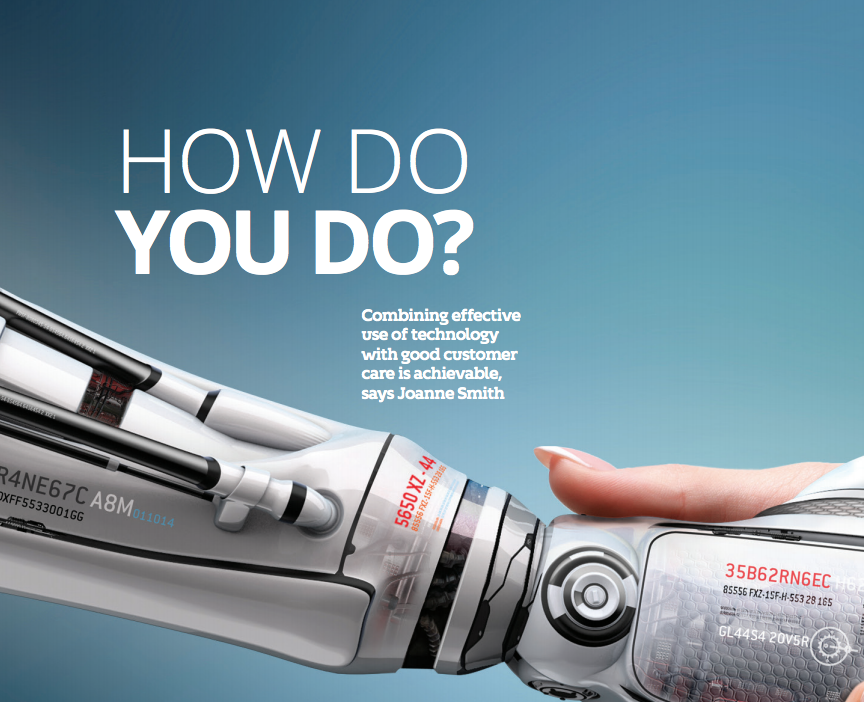Combining effective use of technology with good customer care is achievable, says Joanne Smith
Enhanced access, increased efficiency, greater speed – technology has become an integral and essential part of our lives. Advances in technology have changed our world irreparably and, as a consumer, can either improve or hinder our experiences.
It is a common perception that the increasing automation of services saves corporations money at the expense of jobs and customer experience. The opportunity is for companies to challenge this belief, by utilising technology intelligently, to provide shared value for both the customer and the firm, in turn leading to more satisfied and loyal customers.
Personal service
Today we receive more electronic communications than ever before, and in order to make themselves heard over the noise of competitors, companies are placing ever more emphasis on ensuring positive customer experiences that increase loyalty.
With emphasis on the customer experience there is naturally a pull for technology that provides efficiencies for firms, but also adds value to the customer relationship. Online shopping retailers such as Amazon intelligently uses data gleaned from customers’ preferences to promote more products and services, streamlining the sales and marketing process in a way that creates more revenue opportunities whist also providing value to the customer.
Similarly, RecordSure, a solution for financial services firms, that records and analyses the conversations between frontline staff and customers, aggregates data to provide the firm with key insights about what they do well, where improvements can be made and what their customers think.
Consequently, this solution provides the company with an efficient method of monitoring staff while providing vital information that can improve design of products and services and the experience for customers.
Customer care
Companies have a commercial responsibility to reduce waste by ensuring processes are efficient, regardless of sector or product. However, customer satisfaction should also be of paramount importance.
This comes down to understanding customers’ preferences, designing products and services that meet their needs and distributing to them in a way that is quick and easy.
The increasing automation of services can be an improvement to customer experience particularly where it accelerates process or improves accuracy. However, despite the obvious positives, the pace of change and the complexities of technology can also produce negatives that are a challenge to customers’ perceptions of product or service value.
Any firm that uses technology to streamline process should consider whether its systems:
Increase accuracy and efficiency
How many of us have become frustrated by an automated customer service system that takes us through endless options only to find there is no option that exactly meets our needs? Often, customers would prefer to speak to a human who can assess a problem and handle it more quickly rather than make an uninformed decision themselves based on the options of an automated system.
Firms should obtain first-hand customer feedback and rigorously test whether the systems in use are a barrier to a positive experience.
Improve access
The movement to automated and online systems means that some tranches of society are becoming increasingly marginalised.
For example, bank branch closures make access to financial services harder for those customers who cannot access or use online banking.
There is an increasing focus on ensuring vulnerable customers are catered for and it remains a heightened concern for watchdogs across sectors, particularly in financial services.
Protect trust
Cybercrime and IT systems’ failures can contribute to a lack of confidence and trust in the systems and technology administered to increase accessibility and improve customer experience. Mistrust is an acute concern in the financial services sector especially around the security and safety of money. Retaining this trust should therefore be a top priority.
A poor experience can be persistent and result in avoidance of a particular company or product and discourage customers from using certain technologies. Dissatisfaction is further exacerbated as it creates barriers to services and products that may be beneficial to the customer.
Fulfilling customers’ perception of value will facilitate retention and loyalty, and can be a vital marketing tool. Therefore, using technology intelligently, based on an understanding of customers’ preferences is imperative in a competitive marketplace.
Joanne Smith is CEO of RecordSure (recordsure.com) a unique solution to regulatory requirements and has worked in financial services for more than 20 years. In 2014, she was named Inspirational Woman of the Year in Compliance at the inaugural Women in Compliance Awards.




